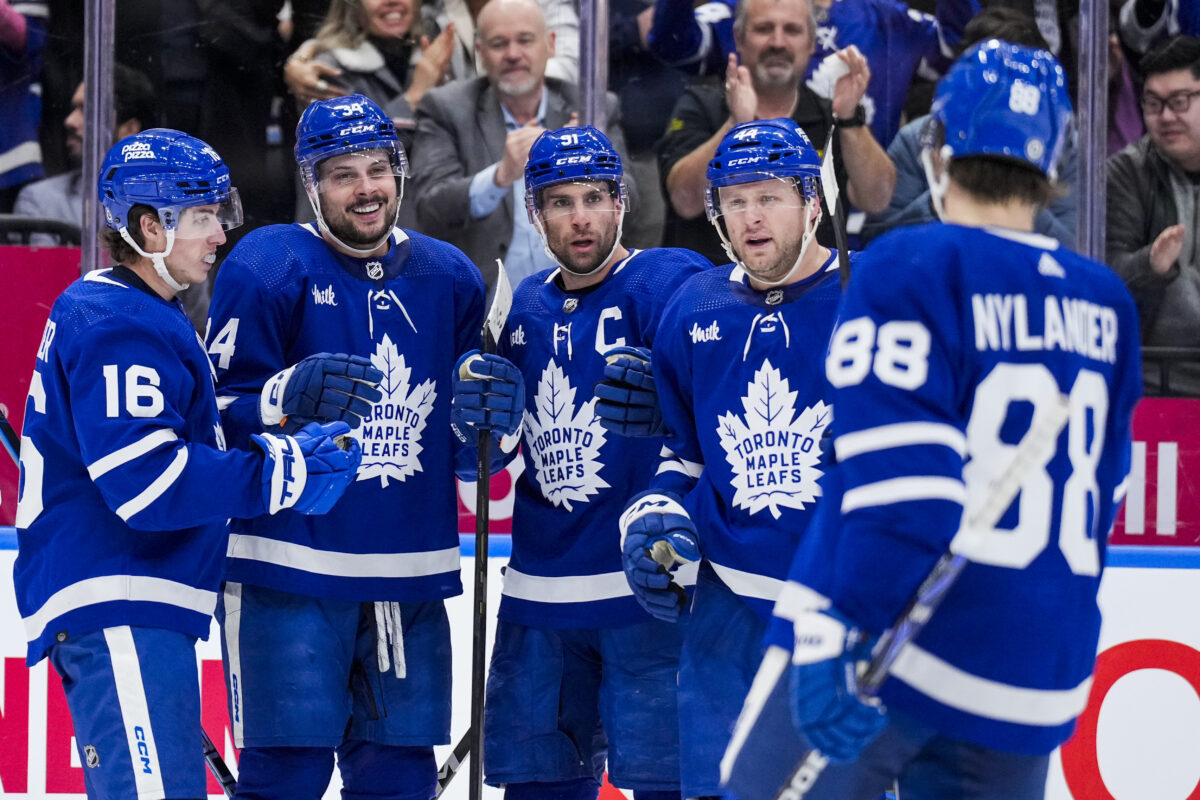Kyle Dubas’ tenure as general manager of the Toronto Maple Leafs will be remembered for many reasons, but one of the most significant aspects is his handling of contracts for the team’s core players. Dubas himself has acknowledged that the timing and nature of these deals may have been the thing he regrets most and when he signed his stars will go down as his biggest mistake as the team’s general manager.
This admission is detailed in a forthcoming book by The Athletic’s Craig Custance, titled “The Franchise: The Business Of Building Winning Teams,” where Dubas reflects on his time with the Maple Leafs. Some might argue the irony of Dubas being mentioned in a book about winning teams considering his teams haven’t won anything…
Where Dubas Went Wrong in Toronto
In the book, Dubas was asked about what he might have done differently and he gave an answer that isn’t surprising. It was his handling of contract negotiations with the core four that he would like to do over. He noted:
“The biggest mistake I think I’ve made in my whole time here has been not taking care of the three incumbent contracts. (William) Nylander was up, (Mitch) Marner and (Auston) Matthews could have been done on July 1 extensions.”
source – ‘LEAFS NOTES: Kyle Dubas delves into his ‘biggest mistake’ in new book and, no, it wasn’t the Tavares signing’ – Lance Hornby – Toronto Sun – 07/11/2024
Dubas told Custance that the deals he struck with his star players could have been extended earlier and potentially at more favorable terms.

Dubas believes that failing to secure these deals promptly set the stage for the team’s subsequent salary cap challenges. Teams are always looking to make smart bets on their top stars and get them signed early. It’s a tactic the Ottawa Senators and Buffalo Sabres have employed and while those particular bets haven’t paid off yet, it is believed they will. Meanwhile, the New Jersey Devils are a club where making an early bet on a top star like Jack Hughes worked. In Edmonton, Leon Draisaitl signed an early extension and became one of the best contracts in the NHL, despite early pushback that it was an overpayment. Had Dubas had the foresight to see these players would have become big stars, he could have locked them up early and built a stronger team around them.
The Core Four Started To Run the Show In Toronto
Nylander’s contract saga in 2018 is a prime example of where things went off the rails. The winger signed a six-year, $41.4 million extension at the eleventh hour, just before the deadline to be eligible for the 2018-19 season. The way things were handled disrupted Nylander’s season—he scored just seven goals in 54 regular-season games and one in the playoffs—but also set a precedent for future contract talks.
Related: NHL Rumors: Predators, Devils, Oilers, Jets, Canadiens
Once the Nylander situation played itself out, the other stars followed suit. Marner’s contract negotiations in 2019 saw him briefly staging a holdout before eventually signing a lucrative deal in September. Matthews, meanwhile, secured a team-high $13.25 million AAV through 2027-28. The fear that he could play out his last year led to him becoming the highest-paid player in the league while also giving him the leverage to sign a four-year deal so that he could hit another home run before the age of 31. These contracts, while locking in the team’s core players, came at a major cost that strained the Maple Leafs’ salary cap flexibility.

Interestingly, Dubas said he didn’t regret his decision to sign John Tavares to a seven-year, $77 million contract in 2018. He acknowledges that the deal had significant ramifications, but it was more about the timing of the deal than the deal itself. “The thing I learned was once we signed John to the (AAV) we did, it lifted the lid on the entire ceiling,” Dubas said. The Tavares deal set a high benchmark for subsequent contracts, making it more challenging to negotiate team-friendly deals with Nylander, Marner, and Matthews.
When You Do Things Matters As Much as What You Do
If there’s one thing Dubas seems to have learned and other GMs should take note of, it’s not always what you do, but when you do it. Some of the most overinflated contracts in the NHL came because of the timing in which those deals got signed. Winning the Tavares sweepstakes felt like a coup for Toronto, but the timing ultimately worked against the team. The large AAV given to Tavares created a ripple effect that the organization is still dealing with today.
These high-value contracts have made it difficult for the Maple Leafs to build a well-rounded roster. Moreover, giving so much leverage to the top guys has created a huge issue and the team has struggled to find the right balance between paying its stars and maintaining depth. This has been a point of contention among fans and analysts, with many pointing to the lack of cap space as a significant obstacle in the Leafs’ quest for playoff success.
Brad Treliving, Dubas’ successor as general manager, now faces the challenge of navigating these financial constraints and the reviews of the work he’s been doing to date have been mixed.